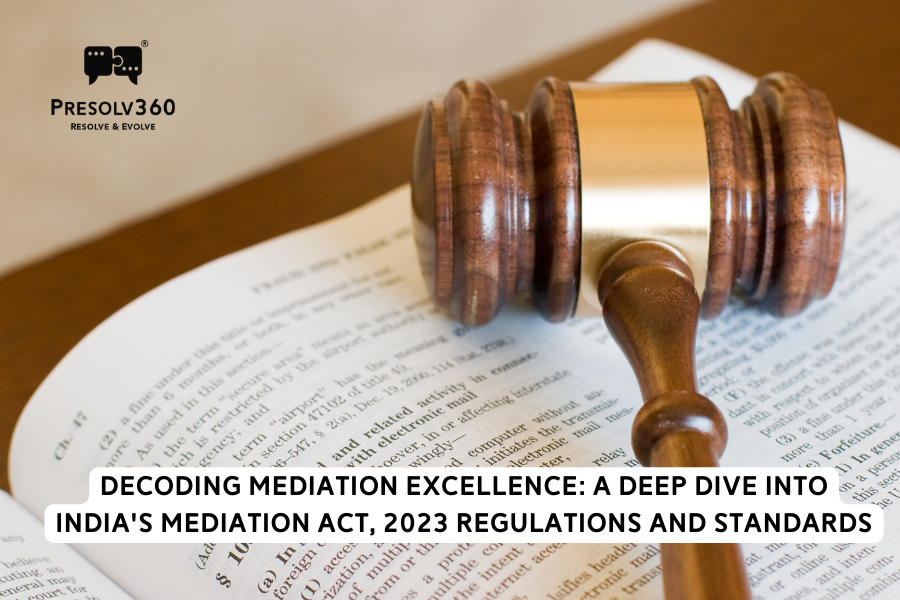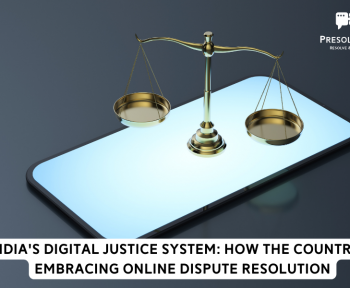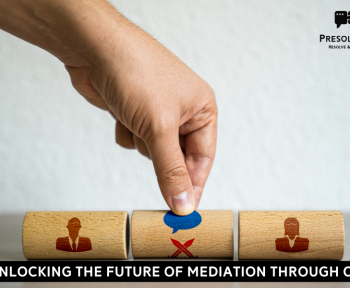The Mediation Act, 2023 (‘Act’) was passed by the Parliament in August 2023. It received presidential assent on 15 September 2023. Promoting and facilitating institutional mediation and making online mediation an acceptable and cost-effective process are among the various objects of the Act.
Section 52 of the Act empowers the Central Government to make rules for carrying out the provisions of the Act. Further, Section 53 empowers the Mediation Council of India (‘MCI’) to make regulations consistent with the Act.
The Ministry of Law and Justice had, earlier in 2023, set up a committee to make recommendations towards these rules and regulations. The report of the committee, led by Former Law Secretary PK Malhotra, has been submitted. This article attempts to study the committee’s key recommendations and suggestions to further strengthen and streamline mediation in India.
Standards for professional and ethical conduct of mediators
The draft regulations state that a mediator must disclose his interest, potential or actual bias, any matters that may affect their impartiality, and any aspect of the mediation that may affect the willingness of parties to participate.
Critically, the draft regulations stipulate that the parties must expressly agree, in writing, for the mediation to be conducted by the said mediator after the disclosures are made.
The disclosures by the mediator are typically made after an agreement to mediate between parties and the subsequent appointment of a mediator. The need for another written express agreement at stage creates an additional touch point. While it is essential to ensure that mediations are conducted impartially without any bias on the part of the mediator, it must also be noted that mediation, as a concept, emerged from the need for an informal process of dispute resolution. Creating specific requirements in this process may have the effect of rendering mediations less preferable to parties.
It further lays down the method in which the mediator shall conduct the mediation.
Registration of settlement agreements
The draft regulations stipulate that a settlement agreement may be registered before the Registration Authority by presenting the original mediated settlement agreement and laying down the process for it.
However, the process does not deal with settlement agreements executed online.
Certifying Online Dispute Resolution (‘ODR’) platforms
While the draft regulations define the term ‘platform’, they stipulate that separate suitable guidelines and procedures may be framed for certifying ODR platforms.
The specific mention of Online Dispute Resolution, in the regulations, is a step in the right direction in promoting the growing ODR sector in the country. ODR platforms must be treated at par with brick-and-mortar mediation institutions and therefore, if separate guidelines are being framed for ODR platforms, they must be in line with the guidelines mentioned for other mediation service providers in these regulations.
Obligations of mediation service providers
The draft regulations lay down the obligations of Mediation Service Providers providing a platform for conducting online mediation. These include providing adequate information to the parties about the platform, acknowledging receipt of all communications made through the platform, informing the parties regarding various stages of the proceedings, following norms regarding data protection and ensuring the security of the platform.
Registration of mediators
To be registered as a mediator, individuals must meet the committee’s recommendations, which include being over 21, holding a graduate degree, and successfully completing a mediation training program. Additionally, candidates should have completed 10 mediations or 5 successful ones. If not the person must have undertaken 5 mock mediations in the previous year, certified by a mediation institute.
While registration is not compulsory for a person to act as a mediator, this would encourage parties to conduct their mediation through registered mediators.
The regulations, however, must create automatic forms of registration for experienced mediators who have already undertaken a large number of mediations. Additionally, since in most cases the outcome of a mediation is not necessarily dependent on the performance of a mediator, a distinction must not be made between successful and unsuccessful mediations in determining the experience of a mediator seeking to be registered.
Recognition of Mediation Service Providers (‘MSP’)
The MCI must recognize all institutions performing MSP functions based on the Committee’s recommendations. It lays down various eligibility criteria for the same. The MSP must be a society or a body corporate and:
Its objects must be to perform the functions specified in the Mediation Act
- It must not be under the control of a person resident outside India
- It must not be the subsidiary of a commercial body corporate
- It must have at least two registered mediators as its directors or employees
- It must have a case management system
As India looks to become a hub for institutional ADR and ODR, we must ensure that the policies and regulations are facilitative towards the growth of such institutions and platforms, rather than being restrictive. We must look to encourage innovation and investment in the sector and institutions/platforms must be free to choose their organizational structure. Additionally, as long as the mediation service provider has mediators empanelled with it to undertake the mediations referred to them, there should be no requirement of the directors or employees of the organisation being mediators themselves. Institutions must have the freedom to choose their directors and employees without any such regulatory requirement. Further, organisations that are already working with any courts in the country or with any government bodies for mediation must be provided automatic recognition.
The MSP recognition remains valid for 5 years, requiring renewal afterwards. The regulations lay down the process for application, conditions for recognition and refusal, process of renewal and withdrawal.
Recognition of Mediation Institute (‘MI’)
Similar to the provision regarding recognition as an MSP. The draft regulation in the committee report also suggests criteria for recognition as an MI. The MI must be a society or a body corporate and:
- Its objects must be training, continuous education and certification of mediators
- It must not be under the control of any person resident outside India
- It must not be the subsidiary of a commercial body corporate
- It must have at least two mediators as its directors or employees
To increase the quality of mediator training and programmes, the MIs must be provided the freedom to choose their structures and processes. A restrictive criterion may have the impact of limiting the growth of good-quality MIs in the country.
MIs shall also, as per recommendations of the committee, receive recognition for five years after which the recognition must be renewed through a renewal application to the MCI.
Mediation training programme
The committee has laid down the curriculum of the mediation training programmes. And has recommended that any training programme provided by a recognized MI must incorporate the said curriculum.
The committee further recommends that the mediation training programme must have a minimum duration of 40 hours. It must define and use a competency framework. The committee also encourages the use of different teaching methods. That includes observational exercises, interactive sessions, group discussions and role-plays, among other things. It shall also enable the conduct of mock mediations.
Other obligations of MSPs and mediation institutes
The committee in its report also recommends that each MSP shall have an internal grievance redressal mechanism. To redress any grievances raised against a mediator accredited to it or in its panel.
MIs shall also have an internal grievance redressal mechanism. To redress any grievances raised against it by a trainee concerning the programme.
Further, the committee also recommends that MSPs must submit an annual report to the MCI. Listing out details regarding the mediators, facilities and infrastructure, number and details of mediations conducted by them, number and details of the settlement agreements arrived at through mediations handled by them and details of the work done by the MSP towards promoting professional and ethical conduct amongst its empanelled mediators.
Mediation institutes have also laid down a similar reporting requirement.




